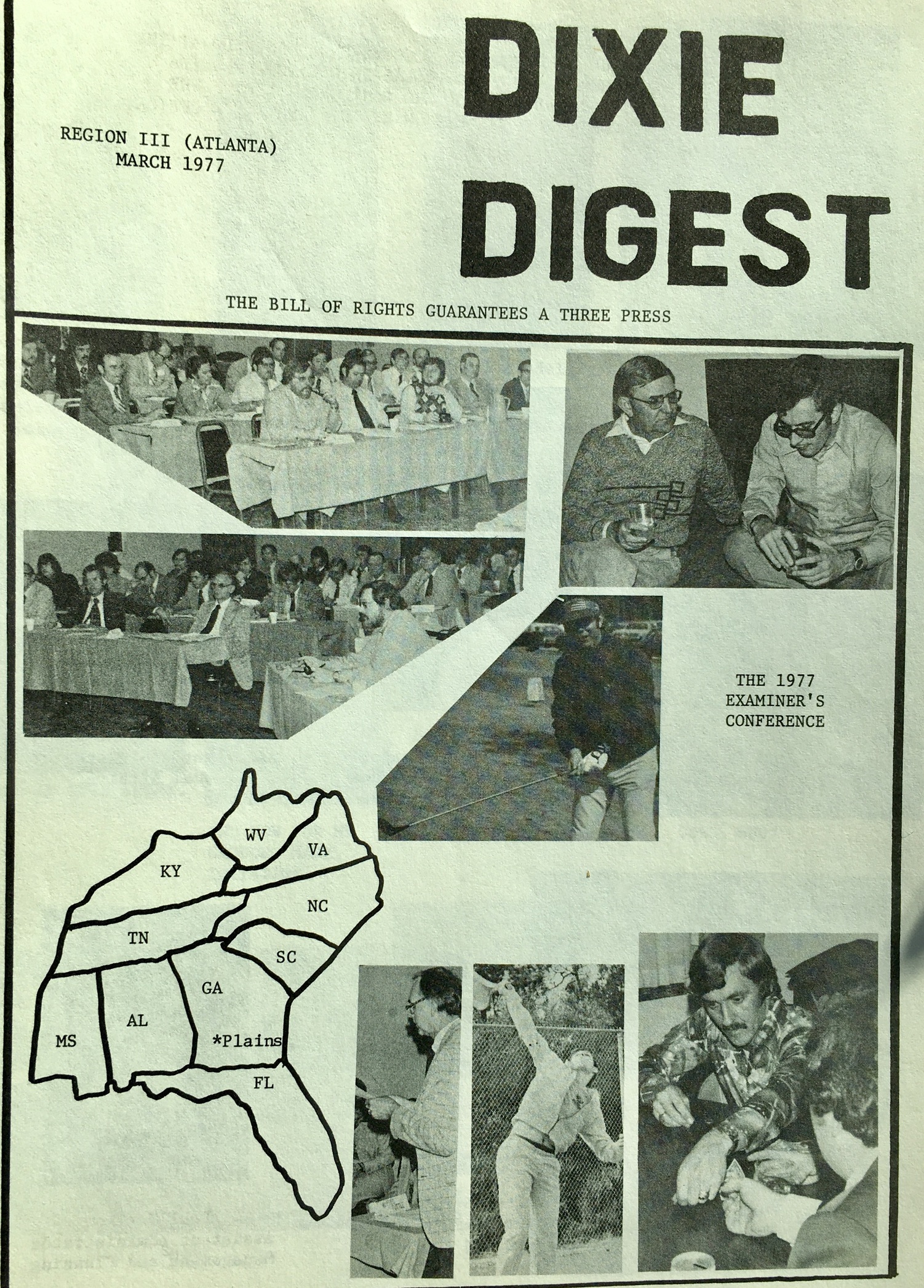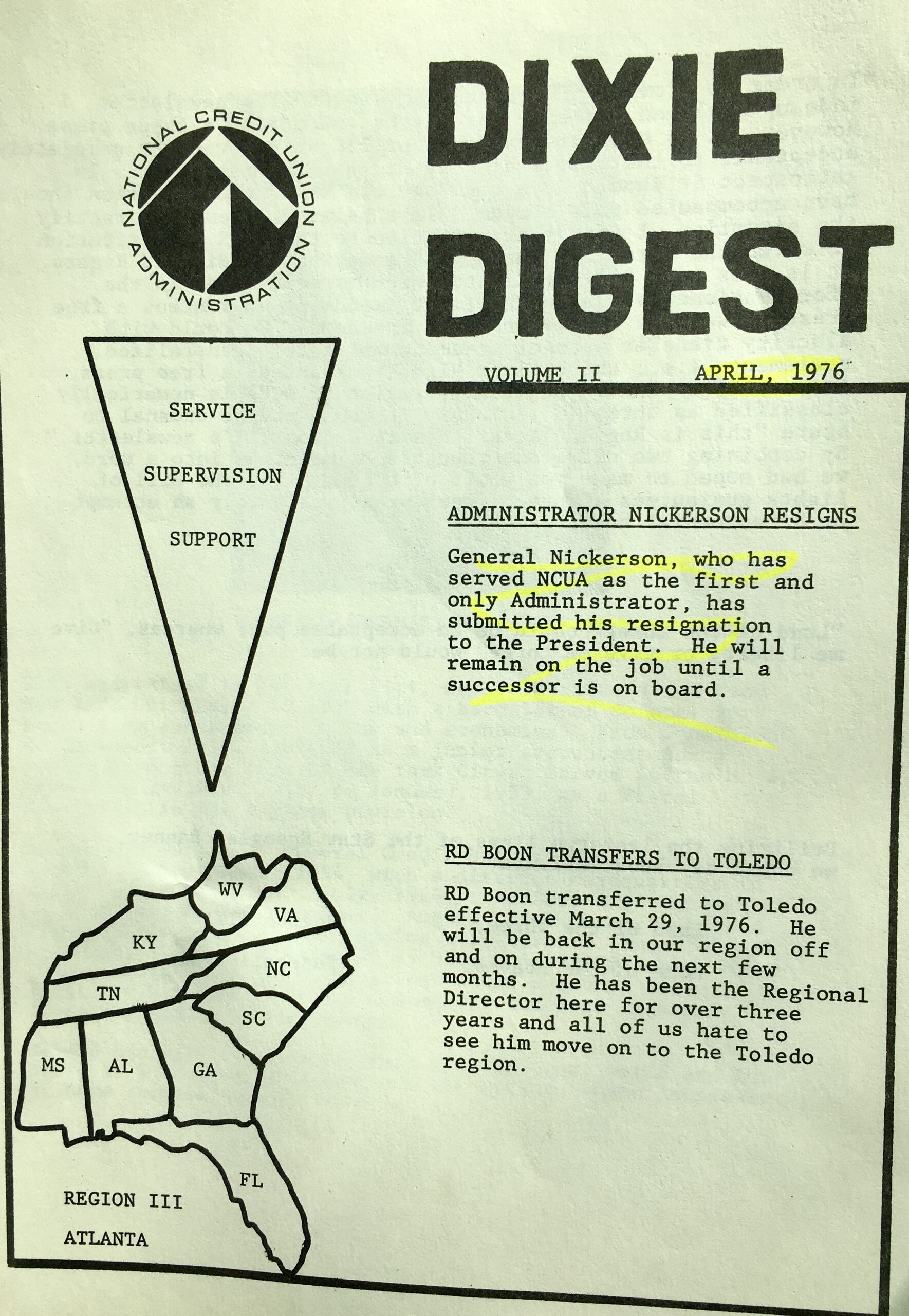An 8-10 page monthly printed internal newsletter, Dixie Digest, was published by Region III staff for a number of years in the mid 1970’s.
Unlike many semi-official government publications, these updates focused solely on the people in the Region. Their retirements, vacations, new hires and occasional conferences. No numbers, no exam or rule updates. Just stories, sometimes irreverent, and plenty of pictures, many submitted by the staff.
One editor, or compiler of this family work album, was Mike Riley who oversaw the production for at least two year (1976-1977) when he was in the Atlanta regional office. After Mike’s death in January, his wife Lori shared his collection of issues with me.
They are a delightful record of a culture of fun, respect and occasional visits from the powers that be in DC. It also is a valuable insight into the early careers of many later leaders of NCUA.
The Editor’s Ambition: “Scoff or Twitter”
The monthly issues also reflect a very humorous, even playful, wit by Mike. His editorial credo on the front of an issue was, “The Bill of Rights guarantees a Three Press.” Everyone thought typo, and so Mike explained his moto:
“In order to pride a bicentennial flavor to the newsletter, I made up a slogan. However, it was evident that this brilliant pun was not completely acceptable to the masses as they did not understand it. It is now obvious in retrospect that an explanation should have accompanied it.”
He then describes the first ten amendments to the US Constitution and the importance of the first on free speech.
“As most of you know, the Atlanta region of NCUA is numerically classified as three (3). Thusly it would not be unusual to state “This is Region III’s newsletter. By combining two different meanings into one word, we had hoped to make you scoff or twitter. So the “Three” press was purely an attempt at bicentennial humor.”
NCUA Leadership Changes-DC Visits
In the next several years there would be three quick changes at the top of NCUA. In April 1976, the first and to that date, only Administrator of the Bureau of Credit Unions, General Nickerson, submitted his resignation to the President.
The August 1976 edition featured a visit by the General’s successor Austin Montgomery. It was a pictorial record (often with Montgomery’s pipe in hand) of the visit and this summary account of his activity:
“Mr. Montgomery arrives in Atlanta on Tuesday night, July 20, and had dinner with RD and Mrs. Gansfried. On Wednesday morning, he toured the office and met with each member of staff. He later gave an informal talk to the staff and expressed his views on the credit union movement and his management philosophy. He answered questions on a wide range of topics.
In the afternoon he met with League personnel and State Supervisors. All ten states in the Atlanta region were represented. He spent Thursday visiting the Georgia Credit Union League and a credit union where an examination was in process. We were most pleased to have his visit and were impressed with his open, frank manner.”
The January 1978 edition featured the visit of the newly appointed NCUA’s first Chairman, Larry Connell. Accompanying him was Eloise Woods who had been chair of the National Credit Union board of advisors, which was discontinued when the three person NCUA board was fully staffed.
Pictures and Stories
These official visits were not the prime focus of the newsletter. It was the employees who often contributed the many black and white photos for which Mike would create irreverent captions. On one birthday party celebration he wrote of those shown: Ed’s birthday cake. Henry is blessing Ed and Foster Bryant is praying. (one must see the picture)
And there are stories by and about examiners.
Examiner Ron Coleman who recently oved into Jackson MS was immediately initiate into the ranks during a visit in the Mississippi Delta near Greenville, MS. The first night we were on the road, the hotel clerk gave Ron a key to a room that had already been rented and occupied. Ron became aware of the problem when he unlocked the hotel room door and cane face to face with a tall, husky and less-than-pleased construction worker who was at that moment in less than fully clothed condition. Fortunately, Ron survived and was able to obtain another room at the other end of the motel.
A Record of Early Professional Experiences
I did not arrive at NCUA until late in 1981. Every current and future regional director and many head office personnel came from Atlanta during my tenure. Among the names are Bob Boone, Bernie Gansfried, Steve Raver, John Ruffin and Mike Riley. It was an ideal training ground for a long term career.
In the future I will share several excerpts which capture an office culture of more than the official triad of “Service, Supervision and Support.” It was a group having fun, sharing their lives and work together, all of it captured by the keen wit of Mike’s eye and pen.
(editor’s note: I enjoy looking at records of credit union and NCUA’s earlier years. Often these documents have little relevance and value when their complier moves on. Please let me know if you have some of these potential treasures in your living or storage spaces. And thanks Lori for sharing Mike’s compilations.)



Chip: I hope that your readers see your reflections on the history of Credit Union as more than just trips down memory lane.
Regardless if you attribute Santayana or Churchill, iI can’t help but think of the famous quote, “ Those who fail to learn from history are doomed to repeat it ,” There have been more than several of such examples in our shared experiences of credit union history.
Thank you, Chip, for sharing this snapshot of Mike’s appreciation, and yes, love for NCUA and the family it represented.
Time moves too quickly, and change is inevitable. Yet as Vic Pantea said above, there’s much to learn from history. Treasured memories can refocus our lens on what is truly meaningful and relevant– beyond eras.